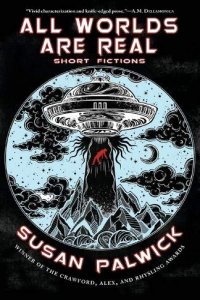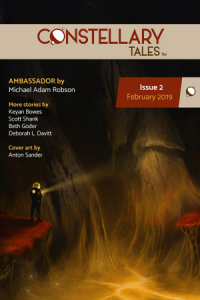Colleen Mondor Reviews Don’t Tell a Soul by Kirsten Miller
 Don’t Tell a Soul, Kirsten Miller (Delacorte 978-0-525-58120-8, $20.99, 384pp, hc) January 2021.
Don’t Tell a Soul, Kirsten Miller (Delacorte 978-0-525-58120-8, $20.99, 384pp, hc) January 2021.
Kirsten Miller’s outstanding thriller Don’t Tell a Soul is not only a first-rate mystery, it also manages to address just what it is about certain ghost stories, specifically those involving dead girls, which are so culturally pervasive. The novel’s protagonist has a special affinity for these girls and how their personal histories and true motivations are often lost in all the creepy associations that surround their deaths. Teenager Bram has come to the Hudson River town of Louth, and her uncle’s ruined mansion, in search of a mystery to solve. She is running from something personally damaging back home in New York and a mother who clearly blames her for whatever went wrong. At her uncle’s, she hopes to find out what caused a fire that killed her uncle’s second wife and sent the wife’s teenage daughter to an asylum. Everyone, her uncle included, thinks Lark set that fire (which was why she was committed), but Bram thinks that conclusion is more than a little too tidy. Even though she and Lark never met, she knows how easy it is to blame a teenage girl when something bad happens, even when she swears it wasn’t her fault.
Yes, Bram has some baggage, and slowly, as the story unfurls, Miller is going to reveal all of it making her an even more compelling and endearing heroine.
First, Bram has to try and get to the bottom of what is going on in Louth. The locals do not like visitors like her, from New York City, as typically most of those visitors have been determined to buy up parts of the town, crafting a theme-park version of gentrification. Then there’s the son of her uncle’s business partner, who wants to spend an unusual amount of time with her, which makes her extremely wary, while an eccentric local rich girl is either a potential good friend or problematic foe. Meanwhile, the door to her bedroom opens by itself and Bram soon sees the same vision of a girl dressed in white that has haunted the house for decades. As she learns more about Lark’s research into dead girls associated with the mansion, Bram realizes that Lark was onto something important and that a lot of the building’s past has been shrouded in the sort of melodrama that makes the sudden deaths of teenage girls more palatable than they should be. Consider this prescient exchange with one of Lark’s friends as Bram learns about the most recent dead girl:
“A girl named April Hughes. She passed away in the 1980s. She was our age at the time. They say she bolted out of the manor in the middle of the night and froze to death in the woods. No one knows what she was running from. I heard the story a hundred times growing up. Here in Louth, it’s one of the Dead Girl stories –”
I had to stop her. “One of the Dead Girl stories?” I felt like I’d heard the name somewhere before, but I had no idea what it meant. “What the hell are those?”
Maisie’s smirk reappeared when she saw she’d managed to shock me. “You know – ghost stories. Kids tell them at sleepovers and on camping trips. There’s Grace Louth, April Hughes, and a bunch of other girls who supposedly fell victim to the manor’s curse. There’s also a ghost girl named Matilda who hitchhikes from Hudson to her grave here in Louth – ”
I stopped her again. “I get it, but why do you call them ‘Dead Girl stories’?”
“I guess because around here all our best ghosts are girls. Aren’t yours?”
I took a moment to consider the question. I’d heard plenty of tales about men with hooks and maniacs hiding under the bed. But I couldn’t recall a single story about a male ghost. Maisie was right. All the best ghosts were girls.
Maisie leaned across the table toward me. Her breath smelled like toothpaste and coffee. “I think you just experienced what they call an epiphany,” she said. “Ghosts and girls go hand in hand. Why do you suppose that is?”
This then becomes the crux of the story: why are so many ghost stories about girls? Bram realizes that anything odd or creepy about a house like her uncle’s is more easily accepted when it is associated with a girl who died there. When another girl tries to understand how or why that death happened, when she starts to ask some uncomfortable questions, dismissing her concerns and saying she is obsessed, or even crazy, is too often the rule. Bram has faced that kind of gaslighting herself and is certain there is more to what has gone on in the mansion than anyone, even Lark, has suspected. Just who the villain is in this story is unclear until the very end, though, and as Bram finds herself threatened from all sides, it’s a race to see if she will get out alive or end up just one more dead girl with another tragic story.
Don’t Tell a Soul is an outstanding and timely drama for the #MeToo era, which combines modern mystery-solving with gothic story elements and no small degree of well-earned righteous fury. All of the characters are intriguing and thoughtful, with Bram, Maisie, and Lark (whose story is largely told as Bram learns about her) particular standouts. The best part, though, is the deconstruction of the “dead girl story” concept. Miller gives readers a lot to think about in the midst of all this classic suspense, and she crafts a riveting, rollicking tale in the process.
Colleen Mondor, Contributing Editor, is a writer, historian, and reviewer who co-owns an aircraft leasing company with her husband. She is the author of “The Map of My Dead Pilots: The Dangerous Game of Flying in Alaska” and reviews regularly for the ALA’s Booklist. Currently at work on a book about the 1932 Mt. McKinley Cosmic Ray Expedition, she and her family reside in the Pacific Northwest and Alaska. More info can be found on her website: www.colleenmondor.com.
This review and more like it in the January 2021 issue of Locus.
 While you are here, please take a moment to support Locus with a one-time or recurring donation. We rely on reader donations to keep the magazine and site going, and would like to keep the site paywall free, but WE NEED YOUR FINANCIAL SUPPORT to continue quality coverage of the science fiction and fantasy field.
While you are here, please take a moment to support Locus with a one-time or recurring donation. We rely on reader donations to keep the magazine and site going, and would like to keep the site paywall free, but WE NEED YOUR FINANCIAL SUPPORT to continue quality coverage of the science fiction and fantasy field.
©Locus Magazine. Copyrighted material may not be republished without permission of LSFF.






